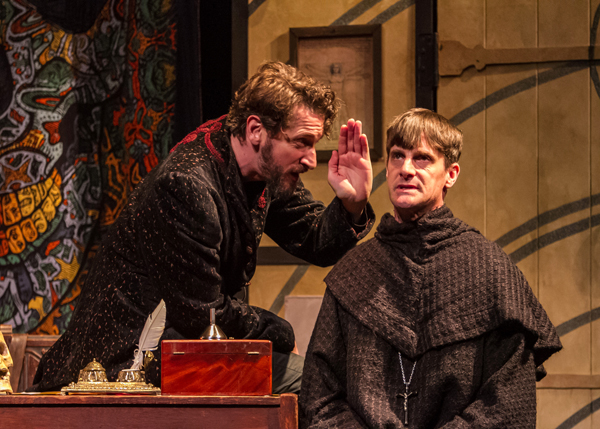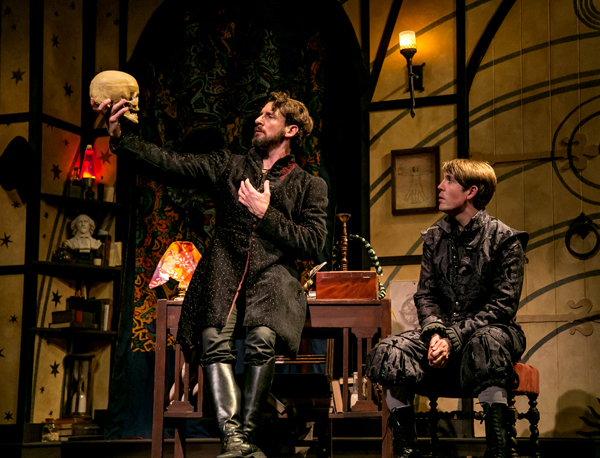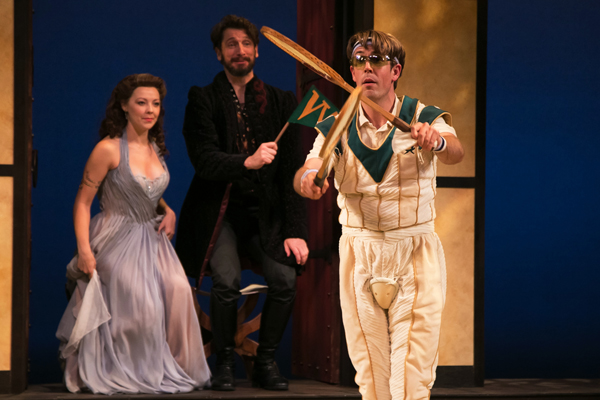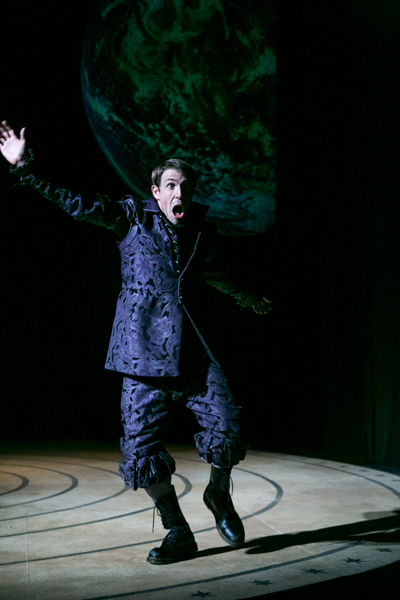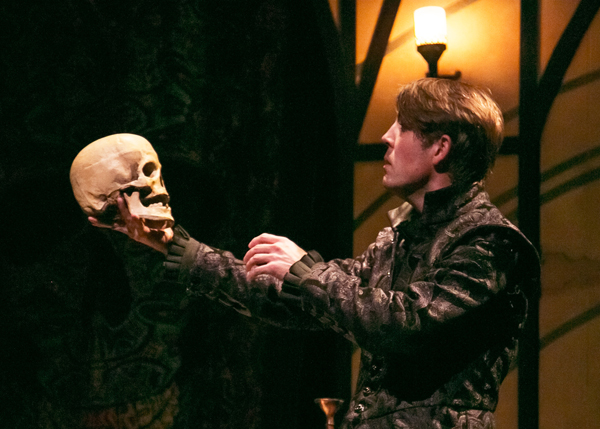“Director Joseph Discher leads an exceptional cast with vision and precision and navigates tonal shifts with finesse.”
“Director Joseph Discher worked meticulously to develop these opposing forces in ideas, worlds, and archetypal character types.”
By David Davalos
Directed by Joseph Discher
Scenic Design by Brittany Vasta
Lighting Design by Matthew Adelson
Costume Design by Hugh G. Hanson
Sound Design by Steven L. Beckel
Production Stage Manager - Denise Cardarelli*
THE CAST
Jordan Coughtry* | Hamlet
Mark H. Dold* | Martin Luther
Anthony Marble* | John Faustus
Erin Partin* | The Eternal Feminine
*member Actor's Equity
“Out of love for the truth and the desire to bring it to light, the following propositions will be discussed at Wittenberg, under the Presidency of Reverend Father Martin Luther, Monk of the Order of Saint Augustine, Master of Arts and of Sacred Theology, and Lecturer in Ordinary on the same at that place.”
“Then, gentle friends, aid me in this attempt;
And I, that have with subtle syllogisms
Gravell’d the pastors of the German church,
And made the flowering pride of Wittenberg
Swarm to my problems as th’infernal spirits
On sweet Musaeus when he came to hell,
Will be as cunning as Agrippa was,
Whose shadows made all Europe honor him.”
“You are the most immediate to our throne;
And with no less nobility of love
Than that which dearest father bears his son,
Do I impart toward you. For your intent
In going back to school in Wittenberg,
It is most retrograde to our desire;
And we beseech you, bend you to remain
Here, in the cheer and comfort of our eye,
Our chiefest courtier, cousin, and our son.”
A prince, a philosopher, and a priest walk into a bar...
It may sound like the beginning of a joke, but in the case of Wittenberg, it is the start of a witty, entertaining and provocative debate about the forces that drive us, and in what we choose to place our trust. What happens when you put a character who would sell his soul for what he desires, the man who sparked the Protestant Reformation, and a young prince suffering from a severe case of indecisiveness in the same place at the same time? They wrestle with philosophy and theology, they grapple with doubt and faith, and they dance between fate and free will--all in their ultimate quest for Truth.
Hamlet and his two professors, Doctor Faustus and Father Martin Luther, each stand at a crossroads in their lives. It is a crossroads with which we are all too familiar. We stand there ourselves on many occasions, troubled, doubting, wondering which path to choose, what to believe (or not to believe), and wondering how much control we have over our own lives. Sometimes we have faith that our problems will resolve themselves. Sometimes we struggle to be the master of our own destinies, and sometimes we question our very existence and purpose. Some of us may listen to Faustus' advice: "Remember: you write the drama of your life, not some unseen hand." Some might heed Luther's: "It is vital always to remember that God has a plan for us."
Is it your own inner voice you listen to, or is it God's? Are you exercising your free will, or are you merely part of a divine plan? Do you believe in doubt or faith? You might choose one over another, or you might want to strike a balance. Or perhaps you stand at the crossroads and the implications are just dizzying.
Not to worry, the doctor is in. So is the priest. They can help whatever ails you.
********
University of Wittenberg -- Founded in 1502 by Frederick the Wise, Elector of Saxony. Building upon the works of Martin Luther, it became the birthplace of the Protestant Reformation. Wittenberg was the center of the German Enlightenment as well. Notable attendees included Dorothea Erxleben, Germany's first female medical doctor, and Georg Joachim Rheticus--a mathematician and cartographer best known for his trigonometric tables, and as the sole student of Nicolaus Copernicus. Rheticus facilitate the publication of Copernicus' On the Revolution of the Heavenly Spheres. In fiction, attendees of Wittenberg include Hamlet and Horatio, from Shakespeare's Hamlet, Shelley's Victor Frankenstein, and Marlowe's Doctor Faustus.
Doctor Faustus -- the protagonist and tragic hero of Christopher Marlowe's play of the same name. Faustus is a man of grand ambition willing to sacrifice his soul for ultimate knowledge and power. He represents the spirit of the Renaissance, particularly in regard to his shunning of the medieval God-centered universe and his embracing of human potential. Faustus makes a pact with Lucifer and is ultimately damned for all eternity. Perhaps the best known speech from the play begins:
Was this the face that launch'd a thousand ships,
And burnt the topless towers of Ilium--Sweet Helen, make me immortal with a kiss.--
Her lips suck forth my soul: see, where it flies!--
Come, Helen, come, I've me my soul again.
"I cannot and I will not recant anything, for to go against conscience is neither right nor safe."
Martin Luther (1483-1546) -- German monk, Catholic priest, and professor of theology at the University of Wittenberg. He strongly disputed the claim that freedom from God's punishment for sin could be purchased monetarily. He challenged John Tetzel, a Dominican friar selling indulgences for the forgiveness of sin (as sanctioned by Pope Leo X) and credited with the saying "As soon as the coin in the coffer rings, the soul from Purgatory springs." Luther's debate took the form of The Ninety-Five Theses on the Power and Efficacy of Indulgences, which argues that forgiveness is a gift from God, not a monetary transaction. Luther posted his Ninety-Five Theses on the door of the Castle Church of Wittenberg, which sparked the Protestant Reformation and led to his excommunication.
"The readiness is all…"
Hamlet -- the title character of Shakespeare's most famous tragedy; prince of Denmark, heir to the throne, "the melancholy Dane." Right or wrong, Hamlet is most often painted as lacking the will to act decisively. In Shakespeare's play, he wrestles with his conscience amidst a "sea of troubles" torn between courses of action such as revenge or mercy, and living or "shuffling off this mortal coil," uncertain whether to subscribe to a divine plan or to his own free will.
The Eternal Feminine -- a psychological and philosophical construct that represents an immutable concept of "woman," or what is at the center of femininity. The idea springs from a belief that men and women have different core "essences" that cannot be altered by time or environment. Within this idealized concept they are often angelic, responsible for drawing men upward on a moral and spiritual path. Specific virtues such as modesty, gracefulness, domesticity, purity, civility, compliancy, and reticence, were regarded as essentially feminine. French philosopher and feminist Simone de Beauvoir regarded the eternal feminine as a patriarchal construct that limits women within a passive "erotic, birthing or nurturing body" and denies a woman's individuality, trapping her inside unrealizable ideals.
"I want more. I choose more."
